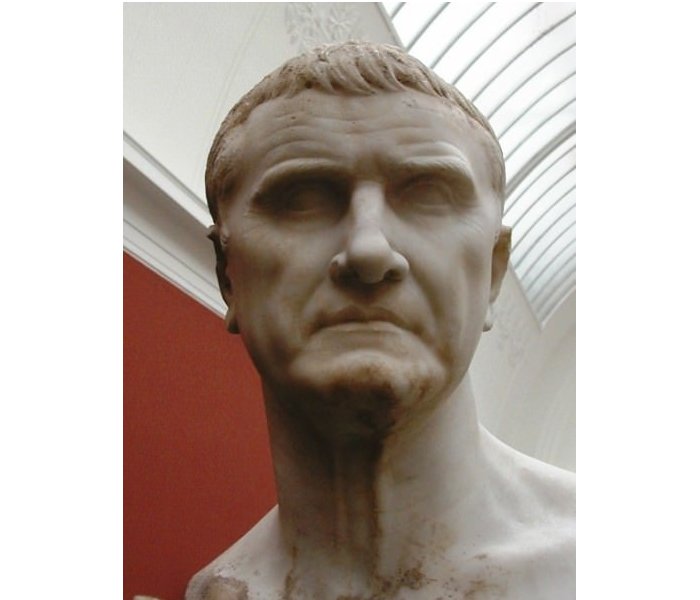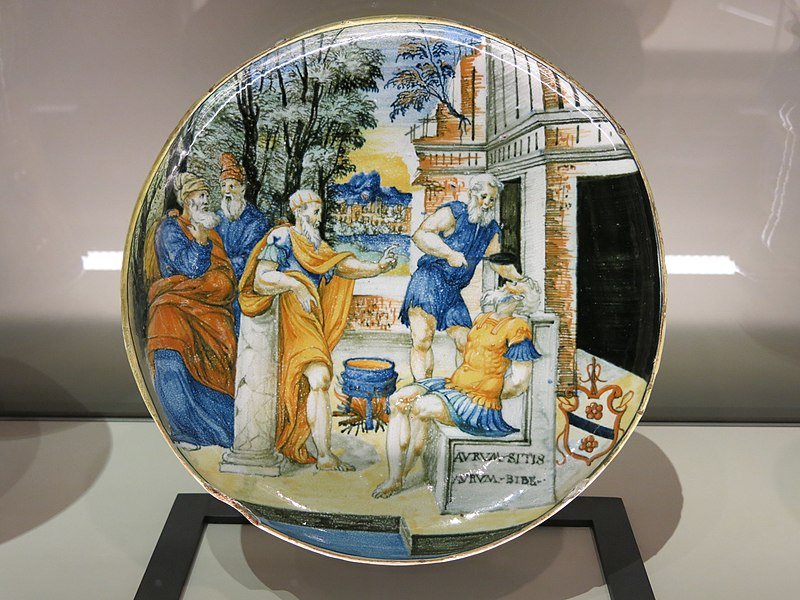Did Crassus, Ancient Rome’s Wealthiest Man Really Die From Drinking Molten Gold?
Ellen Lloyd - AncientPages.com - Marcus Licinius Crassus (c. 115 B.C. —53 BC.) was a Roman general and politician. Today, he is remembered as the wealthiest man in ancient Rome, suppressing the slave revolt led by Spartacus and forming the so-called First Triumvirate with Julius Caesar and Pompey to challenge the Senate's power effectively.
A bust of Roman statesman and general Marcus Licinius Crassus (c. 115-53 BCE). Glyptothek, Copenhagen. Image credit: Diagram Lajard - Public Domain
When Crassus died, a Civil War broke out between Caesar and Pompey. According to some historical sources, Crassus died from drinking molten gold, but is this really true?
Crassus was born a wealthy man but lost his entire inheritance during the Marian-Cinnan proscriptions. He was forced to flee to Hispania (the Roman name for the Iberian Peninsula).
Crassus got his revenge while commanding the left wing of Lucius Cornelius Sulla's army, making a fortune from proscriptions himself.
Soon Crassus became a wealthy man. He earned his fortune from prescriptions, slave trafficking, judicious purchases of land and houses, and purchases of burning property.
Ancient Roman army and their general. Credit: Adobe Stock - vukkostic
Prescriptions were only part of his overall wealth. It is said that after receiving word of houses being on fire, Crassus would arrive with an army of 500 "firefighters" and attempt to offer a modest sum for the property. Crassus would let the property burn to the ground if the offer was refused.
Crassus became a politician and used his wealth to gain support from senators. However, wealth was not enough to give Crassus the power he wanted. Crassus needed a military victory to consolidate his grip on power and make a name for himself in military matters. Crassus used Syria as the launchpad for a military campaign against the Parthian Empire, Rome's long-time Eastern enemy.
The Parthian people had established an empire that lasted almost 500 years, from the mid-3rd century BC until 224 CE. Crassus' military campaign was a disastrous failure, resulting in his defeat and death at the Battle of Carrhae.
It remains unknown whether Crassus died fighting or committed suicide to prevent being captured.
Historian Cassius Dio wrote that the enemy “poured molten gold into his mouth. The torture of Crassus. Faience. Circa 1530-1540 - Louvre Museum. Credit: Tangopaso - Public Domain
Crassus was well-known for being greedy. Plutarch said that "before he (Crassus) went upon his Parthian expedition, he found his possessions to amount to seven thousand one hundred talents; most of which, if we may scandal him with a truth, he got by fire and rapine, making his advantages of the public calamities." He died in pursuit of wealth from Asia."
The rumor about "dying from drinking molten gold" can be traced to historian Cassius Dio who wrote that having discovered his body, the enemy "poured molten gold into his mouth in mockery for he had set great store by money."
Where and how exactly Dio obtained this information is unknown, but it helped Roman prejudices about Parthian brutality.
Written by - Ellen Lloyd – AncientPages.com
Updated on February 11, 2023
Copyright © AncientPages.com All rights reserved. This material may not be published, broadcast, rewritten or redistributed in whole or part without the express written permission of AncientPages.com
Expand for referencesMore From Ancient Pages
-
 Celtiberians: Intriguing Martial Culture And Their Skilled Warrior Infantry
Civilizations | Jul 13, 2024
Celtiberians: Intriguing Martial Culture And Their Skilled Warrior Infantry
Civilizations | Jul 13, 2024 -
 Oxygen Spike Coincided With Ancient Global Extinction
Archaeology | Sep 3, 2021
Oxygen Spike Coincided With Ancient Global Extinction
Archaeology | Sep 3, 2021 -
 Virginia’s Mysterious Vault With Remarkable Secret Ancient Documents Still Raises Many Questions
Featured Stories | Oct 17, 2024
Virginia’s Mysterious Vault With Remarkable Secret Ancient Documents Still Raises Many Questions
Featured Stories | Oct 17, 2024 -
 DNA From 3,800-Year-Old Individuals Sheds New Light On Bronze Age Families
Archaeology | Aug 29, 2023
DNA From 3,800-Year-Old Individuals Sheds New Light On Bronze Age Families
Archaeology | Aug 29, 2023 -
 Our Lives Have Always Been Manipulated By Money – Part 2
Featured Stories | Jun 4, 2022
Our Lives Have Always Been Manipulated By Money – Part 2
Featured Stories | Jun 4, 2022 -
 Home Of The Gods – Ancient Cities, Underground Worlds, Incredible Technology And Date Of Departure – Part 2
Ancient Mysteries | Jun 13, 2018
Home Of The Gods – Ancient Cities, Underground Worlds, Incredible Technology And Date Of Departure – Part 2
Ancient Mysteries | Jun 13, 2018 -
 Ancient Flying Canoes And Magic In The Pacific – Clues In The North – Part 2
Ancient Mysteries | Feb 1, 2020
Ancient Flying Canoes And Magic In The Pacific – Clues In The North – Part 2
Ancient Mysteries | Feb 1, 2020 -
 Unexplained Phenomenon Around Yellowstone Puzzles Scientists
Featured Stories | Nov 12, 2018
Unexplained Phenomenon Around Yellowstone Puzzles Scientists
Featured Stories | Nov 12, 2018 -
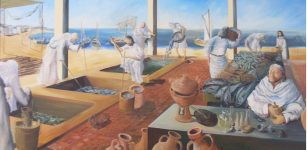 Mediterranean Hunter-Gatherers Relied On Marine Resources More Than Previously Thought
Archaeology | Feb 22, 2023
Mediterranean Hunter-Gatherers Relied On Marine Resources More Than Previously Thought
Archaeology | Feb 22, 2023 -
 Spartacus: The Rise And Fall Of An Unlikely Hero
Featured Stories | Oct 4, 2022
Spartacus: The Rise And Fall Of An Unlikely Hero
Featured Stories | Oct 4, 2022 -
 Ancient Mesoamericans Drank Tobacco In Healing Rituals – Ceramic Vases From Cotzumalhuapa, Guatemala Reveal
Archaeology | Mar 6, 2024
Ancient Mesoamericans Drank Tobacco In Healing Rituals – Ceramic Vases From Cotzumalhuapa, Guatemala Reveal
Archaeology | Mar 6, 2024 -
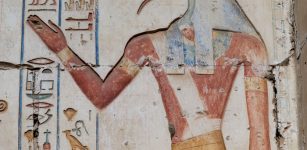 Thoth: Ancient Egypt’s Most Mysterious, Highly Venerated God Of Knowledge And Writing
Myths & Legends | May 24, 2017
Thoth: Ancient Egypt’s Most Mysterious, Highly Venerated God Of Knowledge And Writing
Myths & Legends | May 24, 2017 -
 On This Day In History: Irish Saint Columbanus Founder Of Monasteries In Europe Died – On Nov 21, 615
News | Nov 21, 2016
On This Day In History: Irish Saint Columbanus Founder Of Monasteries In Europe Died – On Nov 21, 615
News | Nov 21, 2016 -
 Sacred Number One: Very Powerful Symbol Equated With The Mystic Center
Ancient Symbols | Oct 2, 2019
Sacred Number One: Very Powerful Symbol Equated With The Mystic Center
Ancient Symbols | Oct 2, 2019 -
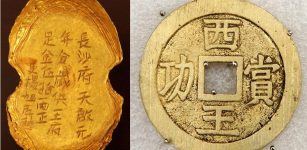 Ancient Legend Is Now Proven True: Sunken Treasure Of Gold And Silver Found
Archaeology | Mar 22, 2017
Ancient Legend Is Now Proven True: Sunken Treasure Of Gold And Silver Found
Archaeology | Mar 22, 2017 -
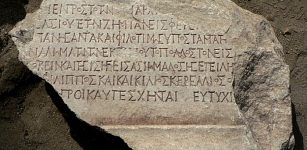 2nd Century Inscription Unearthed At Forum Of Ancient City Of Philippopolis, Bulgaria
Archaeology | Oct 21, 2019
2nd Century Inscription Unearthed At Forum Of Ancient City Of Philippopolis, Bulgaria
Archaeology | Oct 21, 2019 -
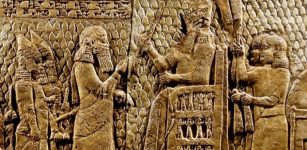 Lost Kingdom Of Idu And Its Seven Unknown Kings
Civilizations | Jul 25, 2023
Lost Kingdom Of Idu And Its Seven Unknown Kings
Civilizations | Jul 25, 2023 -
 Evidence Of Carthaginian Presence In Northern Europe?
Featured Stories | Jun 18, 2022
Evidence Of Carthaginian Presence In Northern Europe?
Featured Stories | Jun 18, 2022 -
 Unexplained Historical Mass Disappearances – Lost Without Trace – Part 1
Featured Stories | May 31, 2019
Unexplained Historical Mass Disappearances – Lost Without Trace – Part 1
Featured Stories | May 31, 2019 -
 Rare 3,000-Year-Old Weavings Discovered In Alaska
Archaeology | Sep 4, 2023
Rare 3,000-Year-Old Weavings Discovered In Alaska
Archaeology | Sep 4, 2023

